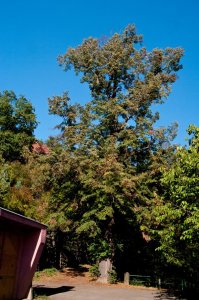
Small-leaved lime (Tilia cordata)

| Occurrence in Děčín |
We can
find the heart-linden lime in all Děčín's urban and chateau parks, in many
street alleys and in private gardens. The largest specimen grew on Teplická
Street, today's final public transport in Bynov. Originally it grew in a
meadow, which was reduced by most of the area by the construction of the
turntable, leaving only a turntable island on the lime tree. It was a beautiful
tree of bizarre appearance, estimated to be 400 years old, with a trunk
diameter of about 2m, with a low-set crown. Several years after the
construction of the turntable lime died. Damage to a beautiful tree, today it
would be the oldest tree in Decin. It was probably part of a historic alley
leading from the chateau in Bynov to other mansions in Jílové and Libouchec,
already built under the Lords of Bünau. At present, the largest heart-linden
tree is recorded in Chlum, has a circumference of 330 cm and a height of 21 m.
The tree you stand at has a trunk circumference of 294cm and a height of 18m.
The largest linden tree of an unspecified species was still a specimen in the
Marian meadow in the first half of the 20th century. It is mentioned in J.A.
Chadt-Sevetinsky: "Old and memorable trees in Bohemia, Moravia and
Silesia", which lists the chateau gardening handbook by V.Cakak from 1899.
Its then circumference was 830cm, and is drawn on a park plan from 1940 near
the Little Castle Pond As The Largest Tree Park. |
| Application |
In
orcharding it is versatile, in parks it is planted as a solitaire or in groups,
even in alleys and alleyways in the streets. It is used in the high-shear walls
in the chateau parks. |
| Habitat |
It not
demanding, growing in rocky habitats, but hates drought. on the plain and on
the slope. It is best suited to deep, permeable soils, but it also grows on
sandy and gravel soils. It is resistant to frost, less to exhalates. |
| Location |
almost
all of Europe |
| Wood |
It has
soft but good wood that is used in wood carving. |
| Fruits |
Narrow,
pointed woody achen at both ends, with 5 distinct ribs, the shell is densely
tomentose. |
| Blossom | Blooms in July, five crowns, after 3-7 in overhanging, glabrous, 5-9cm wide peaks, supporting 5-8cm long. The flowers are highly honey-like, they are also collected for tea drying. |
| Leaves |
Leaves are orbicular
cordate, 3-10cm long, suddenly pointed, base oblique cordate, sharply serrate,
supra green, glabrous, beneath gray-green, along major vein with rusty brown
hair bundles, petiole 1.5-3cm long. Autumn color is yellow. |
| Branches |
Branches are young
olive-green, reddish on the sunny side, initially slightly hairy, early
glabrous. |
| Rind |
The
bark is thin and smooth, brown, oblong-cracked and ribbed. |
| Treetop |
Up to
40m tall tree with broadly ovate crown. It can grow up to 3m in diameter,
exceptionally up to 4m. |
| Note |
Until recently, the largest tree species in the area
was a specimen at the Lipa Hotel in Vysoke Lipa (675cm perimeter), which
however died a few years ago. The largest linden trees in the Czech Republic
grow in the former village of Popov near Jáchymov (894 and 807cm), the
so-called Krupská lime tree in Jablonec u Kuřivod (band. 853cm), two lime trees
in Knapovec near Lanškroun (in. 870 and 480cm), in Vernířovice near Sobotín
(band. 843cm), in Lipka in Chrudimsko (840cm), famous is "Kapistránská linden"
in Jemnice (bandage 700cm, age 600 years). The linden tree in Tatrovice in the
Sokolov region has the largest perimeter (1122cm), but it is a polycormon,
spanning several tribes. Even in 1983, the perimeter was 1650cm, but in 1998 it
was damaged by a storm that disproved the widest of the tribes. The most
bizarre tribe probably has the so-called Žeberská linden tree at the Jezeří
Chateau (620cm), which also has an interesting reputation. The world's largest
linden tree, according to monumental.tree.com, is growing in Ivory, France,
where it reaches the obv. strain 13,19m. |





